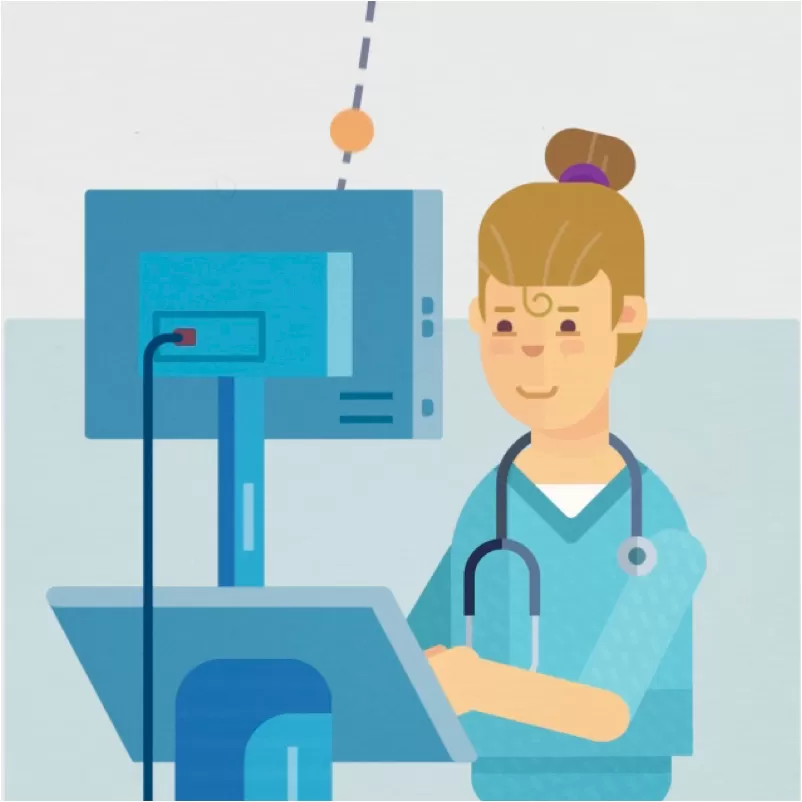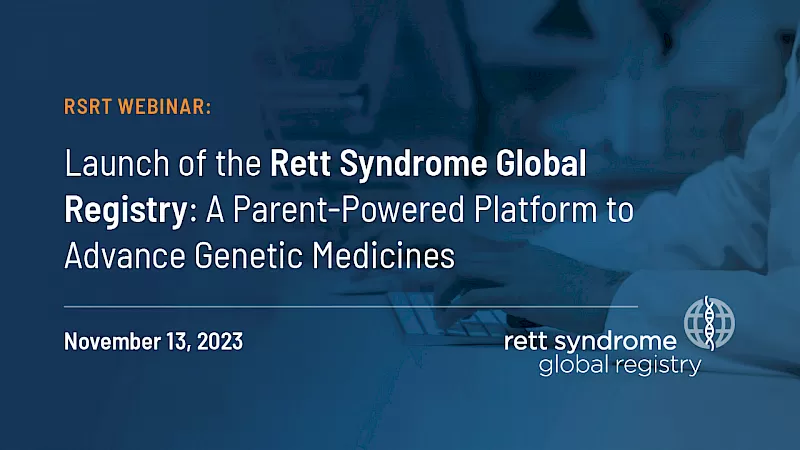Rett Syndrome Global Registry

What is the Rett Syndrome Global Registry?
The Registry is a fully remote, internet-accessible, parent- and caregiver-reported database to centralize your loved one’s information, track and graph health data to see changes over time, share data with doctors to improve care, help researchers make discoveries, and contribute to developing treatments for Rett syndrome.

Who can participate?
The Registry is for anyone diagnosed with Rett Syndrome or anyone with an MECP2 mutation. Parents or caregivers can register their loved one ONLINE and join the Rett Syndrome Global Registry community. The Registry is not for individuals who have another disorder or for those diagnosed with MECP2 duplication syndrome.

Why is my participation important?
Your experience is a valuable resource that can help other families, as well as clinicians, researchers, and biopharma companies. Your information can collectively drive the development of more powerful symptom management techniques and tools, answer research questions, provide insights to create outcome measure tools, and improve clinical trials to be more effective and efficient.

How are my data and privacy protected?
Your loved one’s data will be coded with a unique identifier. Identifying information is kept confidential and only coded data is shared. A highly secure data storage system that meets national and international regulatory requirements for conducting clinical trials, including HIPAA, GDPR, PHIPA, and others, is used. Extra steps have also been taken to further protect your privacy.
Registry Development Team











I am the senior director of research and clinical strategy at RSRT, where I oversee all of our clinical research efforts, including our FDA-regulated ketamine clinical trial, our biosensor development study, and our Rett-ORCA study. Prior to RSRT, my career in drug development was focused on leading FDA-regulated clinical development programs and clinical trial operations teams at pharmaceutical companies in the Boston area, where I designed and ran clinical trials, managed and analyzed data, and authored documents submitted to the FDA. Prior to Rett syndrome, I worked on development teams to advance treatments for pediatric neurodevelopmental and epilepsy disorders, including autism, status epilepticus, complex seizures, Fragile X syndrome, and infantile spasms. At companies outside neurology, I was responsible for various oncology programs in solid and liquid tumors, with experience in the immunology and respiratory fields. Prior to gaining drug development experience, I earned my PhD in genetics and molecular biology at Emory University, where I studied pediatric genetic disorders and conducted research in the Department of Pathology at Yale University. I earned my bachelor’s degree in molecular biology and microbiology at the University of Central Florida. I hope to apply my scientific and drug development experience to the Rett Syndrome Global Registry to expedite therapeutic development and improve the lives of Rett syndrome patients and their families.

I am a pediatric epileptologist and assistant professor in the Department of Pediatrics at Vanderbilt University Medical Center in Nashville, Tenn. I also serve as medical director of the Rett syndrome clinic at Vanderbilt Children’s Hospital. I am passionate about facilitating clinical and translational investigation that helps improve the lives of children with rare neurodevelopmental disorders. I work closely with the Rett syndrome program at the Vanderbilt Kennedy Center and was involved with the NIH-sponsored Rett and related disorders natural history study. I have also served as a co-investigator on several clinical trials for Rett syndrome, MECP2 duplication syndrome, and Angelman syndrome. I earned my MD from the University of Missouri School of Medicine, completed a residency in pediatric neurology at the University of Alabama at Birmingham, and a fellowship in clinical neurophysiology and epilepsy at Vanderbilt University Medical Center. After my fellowship, I spent three years engaged in post-doctoral research in the Department of Neurology at Vanderbilt University Medical Center prior to joining the faculty. I consider it a privilege to be able to learn from and provide care for families with Rett syndrome and am excited to continue helping facilitate research that leads to meaningful treatments for these families.

I’m the director of the CDKL5 Center of Excellence, director of the MECP2 Duplication Clinic, and the medical co-director of the Blue Bird Circle Rett Center at Texas Children’s Hospital. I am also an assistant professor in the Department of Pediatrics and Neurology at Baylor College of Medicine. I am American Board of Psychiatry and Neurology-certified in neurology and epilepsy and enthusiastic about ways I can help children. My interests have grown to include gait analysis and movement disorders. I participated in the NIH-sponsored Rett and related disorders natural history study and have served as an investigator in several clinical trials for Rett syndrome, CDKL5 deficiency disorder, and MECP2 duplication disorder. Originally from Germany, my medical training was completed in Bonn, Germany, at the Rheinische Friedrich-Wilhelms Universtät. I then spent six years in the lab in a post-doctoral position in developmental neurobiology at Massachusetts General Hospital and Harvard Medical School, and then completed my residency in pediatrics and pediatric neurology at Texas Children’s Hospital. It is my pleasure to advance medical research on rare diseases, including Rett syndrome.

I’m a pediatric neurologist and professor of pediatrics, neurosurgery, and neurological science at Rush University Medical Center (RUMC) in Chicago, Ill. I serve as the co-director of the Molecular Diagnostics Section of the Genetic Laboratory at RUMC. My clinical focus is neurogenetic disorders and neurodevelopmental disabilities. My drive to study, understand, and develop treatments for these diseases grew from my lifelong fascination with how the brain and neurons function. Thirty years ago, I set my focus on Fragile X and established the comprehensive Fragile X Clinic and Research Program in 1991. My work has led to numerous awards over the last 20 years, including the Jarrett Cole Award, the FRAXA Champion Award, the NFXF William and Enid Rosen Research Award, the March of Dimes Jonas Salk Research Award, the American Academy of Neurology Sidney Carter Award in Child Neurology, the John Merck Fund Sparkplug Award, and the Martha Bridge Dencla Award from the Child Neurology Society for work in cognitive disorders in child neurology. My work has expanded from clinical, molecular, and translational research in Fragile X syndrome to include translational work on other developmental and degenerative disorders, including Rett syndrome, autism spectrum disorders, Down syndrome, Angelman syndrome, Phelan McDermid syndrome, creatine transporter deficiency, Batten disease and Niemann-Pick type C. I have a bachelor’s degree in chemistry from the University of Notre Dame and earned my MD and PhD in biochemistry from the University of Chicago. After completing residency and a pediatric neurology fellowship there as well, I moved to RUMC. My goal is to help develop life-changing medicines that target mechanisms of disease for people with these neurological disorders.

I am an attending pediatric neurologist in the Division of Neurology at Children’s Hospital of Philadelphia (CHOP) and associate professor of neurology at the Perelman School of Medicine at the University of Pennsylvania. I specialize in diagnosing and treating children with developmental epilepsies (including infantile spasms syndrome), brain malformations, and other neurogenetic conditions. As such, I run the neurogenetics, Rett, and CDKL5 clinics at CHOP. My clinical research focuses on Rett syndrome, Dravet syndrome, Lennox-Gastaut syndrome, CDKL5 syndrome, and related disorders, and I am involved in clinical trials for novel therapeutics for these disorders. I also have a basic and translational science lab where I study mutations in genes that cause epilepsy and how developmental disorders lead to the early epileptic encephalopathies using mice as models of these conditions. I earned my MD and PhD from the New York University School of Medicine, and I completed my pediatric residency at Bellevue Hospital. My residency and fellowship in pediatric neurology and clinical research were completed at CHOP. I look forward to facilitating progress in research for Rett syndrome.

I am a board-certified and Massachusetts-licensed genetic counselor focused on clinical genetic counseling and research in neurodevelopmental disorders. My career has focused on rare disorders such as Rett syndrome and CDKL5 deficiency disorder. In my role as the genetic counseling program manager for our Rett and CDKL5 research program at Boston Children's Hospital, I have been involved in the development and implementation of multiple interventional clinical trials and conducted observational research studies to characterize the natural history of these disorders. In this role, I implement and oversee various observational research studies and clinical trials, including oversight of participant recruitment and enrollment, protocol development, consent form composition, regulatory issues, and supervision of research staff. I also serve as the primary liaison with funding agencies, pharmaceutical industry partners, and patient advocacy groups. In my clinical role I provide genetic counseling for patients with MECP2-related disorders, CDKL5 deficiency disorder, and other rare neurodevelopmental disorders. I earned my master’s degree in genetic counseling and my bachelor’s degree in psychology from the University of Minnesota. Like many other genetic counselors, I love the intersection between cutting-edge science and working closely with our patients and their families. I hope my work allows me to be able to advance research for Rett syndrome and empower these families with information and support.

I am a senior scientist and director of the genomics, ethics, and translational research program at RTI International. Much of my career has focused on understanding the needs of individuals with rare genetic conditions and their families, especially those with Fragile X syndrome and, more recently, Rett syndrome. This work has been varied and includes registry development, in-person and survey research studies, and outcome measure development for clinical trials. Other work has focused on newborn screening to identify rare genetic conditions before symptoms are present. This work has included pilot screening studies, the provision of technical assistance to states on how to screen for new genetic conditions, and partnering with patient advocacy groups to develop educational materials for families and healthcare providers. I’ve been given several awards during my career; RTI’s Highly Published Award, Career Author Award, and RTI’s President’s Award. I earned my PhD in early childhood and special education and my master’s degree in educational psychology from the University of North Carolina at Chapel Hill, after receiving my bachelor’s degree in psychology from Franklin & Marshall College in Pennsylvania. My hope is to have thoughtful and functional tools to assess and properly represent the impact of rare diseases such as Rett syndrome on individuals and their families.

Our Parent Committee of 15 parents was assembled to ensure the registry would meet the needs and expectations of the families using it. The committee contributed to the type of information collected and the unique features the registry offers, including the customizable symptom tracker, the home screen design, information search feature, and connection with other families, and they participated in testing and provided feedback as the registry was built.

We sought the advice of other organizations to learn from their registry experiences. The following groups were a source of inspiration and graciously shared their time, successes, lessons learned, materials, and great ideas to support our vision of the registry: Cystic Fibrosis Foundation, Friedreich’s Ataxia Research Alliance, Foundation for Angelman Syndrome Therapeutics, Loulou Foundation, Michael J Fox Foundation, Patients Like Me.

The Biopharma Advisory Committee was formed to ensure the registry could support and expedite clinical development programs for Rett syndrome. The advisory committee contributed to the type of information collected and how registry data summaries should be presented to best aid clinical trial planning and support regulatory interactions with the FDA. The members of the Biopharma Advisory Committee were Shape Therapuetics, Taysha Gene Therapies, and Novartis Gene Therapies.


